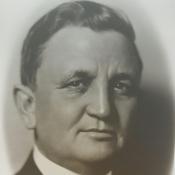Arthur Edward Andersen
 The son of John William and Mary Aabye Andersen was born on May 30, 1885, in Plano, Illinois. He graduated from Atheneum High School, Chicago, in 1903. He received a bachelor's degree from Northwestern University in 1917. Honorary Doctor of Laws degrees were conferred upon him by Luther College in 1938, and by Northwestern University, Grinnell College, and St. Olaf College in 1941. He was certified as a CPA in 1908 (Illinois); he was the youngest CPA in Illinois at that time.
The son of John William and Mary Aabye Andersen was born on May 30, 1885, in Plano, Illinois. He graduated from Atheneum High School, Chicago, in 1903. He received a bachelor's degree from Northwestern University in 1917. Honorary Doctor of Laws degrees were conferred upon him by Luther College in 1938, and by Northwestern University, Grinnell College, and St. Olaf College in 1941. He was certified as a CPA in 1908 (Illinois); he was the youngest CPA in Illinois at that time.
From 1901 to 1907 he was employed by Fraser & Chalmers Company, which later became a part of Allis-Chalmers Manufacturing Company. In 1907 he joined Price Waterhouse & Co. as a senior accountant, the position he held until 1911 when he resigned to join Jos. Schlitz Brewing Company as controller. In 1913 he and a partner established the firm now known as Arthur Andersen & Co; he served as senior partner until his death.
He was active in professional organizations, serving as president (1918-19) of the Illinois Society of CPAs and serving on the Illinois Board of CPA Examiners (1926-28). He served on various committees of the AICPA, including the Committee on Form and Administration of Income Tax Laws (1923-24) and was the chairman of the Special Committee on Definition of Earned Surplus (1924-30). Other professional affiliations included membership in AAA and the American Economic Association.
He devoted much of his time to accounting education. While practicing accounting, he was associated with Northwestern University as lecturer (1909-12), assistant professor (1912-15), and professor (1915-22). He also served as head of the accounting department from 1912 to 1922, when he resigned to devote full time to his professional accounting practice. He wrote numerous articles for professional journals and he authored Complete Accounting Course (1917). He also authored the following in pamphlet form: Financial and Industrial Investigations (1924), The Major Problem Created by the Machine Age (1931), Duties and Responsibilities of the Comptroller (1934), The Future of our Economic System (1934), Present Day Problems Affecting the Presentation and Interpretation of Financial Statements (1935), and A Layman Speaks (1941). He was a member of Alpha Kappa Psi, Beta Alpha Psi, and Beta Gamma Sigma.
Active in civic and community services, he was president, Chicago Home for the Friendless (1923-25); member (1927-32) and president (1930-32), Board of Trustees, Northwestern University; trustee, Century of Progress, Chicago (1933-34); president, Norwegian-American Historical Association (1936-42); director, State Bank & Trust Co. (Evanston, Illinois); and member, Taxation and Finance Committees, U. S. Chamber of Commerce. He was decorated in 1940 by the Norwegian Government with the Knight Commandees Cross of the Royal Order of St. Olav.
He married Emma Barnes Arnold on August 8, 1906; they had three children. In his leisure time he enjoyed golf, fishing, reading, photography, travel, music, and art. He died on January 10, 1947 at the age of 61.
 The son of John William and Mary Aabye Andersen was born on May 30, 1885, in Plano, Illinois. He graduated from Atheneum High School, Chicago, in 1903. He received a bachelor's degree from Northwestern University in 1917. Honorary Doctor of Laws degrees were conferred upon him by Luther College in 1938, and by Northwestern University, Grinnell College, and St. Olaf College in 1941. He was certified as a CPA in 1908 (Illinois); he was the youngest CPA in Illinois at that time.
The son of John William and Mary Aabye Andersen was born on May 30, 1885, in Plano, Illinois. He graduated from Atheneum High School, Chicago, in 1903. He received a bachelor's degree from Northwestern University in 1917. Honorary Doctor of Laws degrees were conferred upon him by Luther College in 1938, and by Northwestern University, Grinnell College, and St. Olaf College in 1941. He was certified as a CPA in 1908 (Illinois); he was the youngest CPA in Illinois at that time.